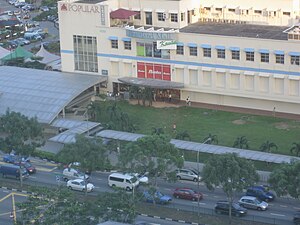 Image via Wikipedia
Image via Wikipediaby Neo Chai Chin
05:55 AM Jun 09, 2009
THE criteria for calling the 993 ambulance to ferry suspected Influenza A (H1N1) cases to hospital is clear-cut, but doctors must make an "appropriate assessment" for patients who fall into grey areas, said the Ministry of Health (MOH) yesterday.
This issue has come under the spotlight as it surfaced that patient No 12 - who had returned from Melbourne - had been told by a doctor he most likely had seasonal flu. The 993 ambulance hotline operator had also told him to seek his GP's advice a second time, upon which the 18-year-old then took an MRT ride from Serangoon to Kovan to do so.
Both the doctor and the operator had spoken to patient No 12 before MOH had classified Melbourne as an "affected area".
Clear-cut suspect cases are unwell patients who have travelled in the past week to affected areas - places with evidence of community transmission. "Notwithstanding the above, doctors may encounter patients with variable travel/clinical histories and they are in the position to make the appropriate assessment," said an MOH spokesman.
In other words, doctors may meet patients from countries with H1N1 cases but which have yet to be considered "affected", and it is up to them to make a judgment call.
So far, over 70 countries have reported H1N1 cases, but only six countries or territories are considered "affected" by the MOH.
Should doctors play a bigger role in keeping abreast of H1N1 updates?
President of the Singapore Medical Association Chong Yeh Woei thinks it will be tough. "I think it's quite hard to keep track of what's happening globally, so we have to depend on the World Health Organization and MOH," he said. "This situation is happening very quickly on the ground. The wave front of this virus is moving very fast."
What happened with patient No 12 was "unfortunate", but "I don't think it could have been handled differently", said Dr Chong.
Should the MOH formally extend the scope of its ambulance service to cover those with travel history to all H1N1-infected countries?
The Ministry spokesman said the focus is on affected areas for now. Hotline calls must be handled "in a judicious manner so as to facilitate the timely despatch of ambulances to cases that carry a higher risk of infection", she said.
In an update yesterday, MOH said a suspected case of H1N1 had tested negative. Also, patients No 10, 11 and 12 were discharged from the Communicable Disease Centre and six patients are in stable condition in hospital.
From TODAY, News – Tuesday, 09-Jun-2009










No comments:
Post a Comment